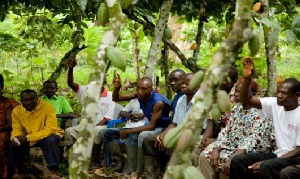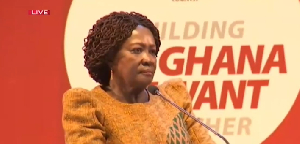Business News of Saturday, 13 October 2018
Source: newswiregh
National Biosafety Authority has betrayed us; campaigning for GMOs - Farmers
The Peasant Farmers Association of Ghana, has expressed disappointment in the National Biosafety Authority over the handling of activities relating to GMOs in the country.
According to the Peasant Farmers Association, the National Biosafety Authority has betrayed farmers by violating Act 2011, (Act 831) on which the authority was instituted and which mandates it to independently regulate the activities of GMOs in Ghana.
The disappointed members of the Peasant Farmers Association in a statement, further accused the Biosafety Authority of abandoning its obligation to rather push for the introduction of the Genetically Modified Organisms (Foods).
“The Authority was mandated, per the Act, to ensure an adequate level of protection in the field of safe development, transfer, handling and use of genetically modified organisms from biotechnology that may have adverse effect on health and environment. In addition, the Act requires the establishment of a transparent and predictable progress to review and make decision on genetically modified organisms and related matters,” part of the statement reads.
But the National Biosafety Authority, led by its Chief Executive Officer, Dr. Amaning Okoree has relegated the mandate of the authority and desperately working to deceive Ghanaians into accepting GMOs in Ghana, the Peasant Farmers claim.
“The posture and public utterances of the Authority led by its CEO, Dr. Amaning Okoree clearly portrays desperate efforts to ensure the introduction of GMOs in the country, relegating the scope and mandate of the authority,” the association stated.
The Authority, according to the association, has deliberately excluded farmers from participating in a forum to educate stakeholders on GMOs so as to push their selfish agenda.
“The Authority deliberately engaged agricultural students and other stakeholders at a forum dubbed “#AskAboutGMOs” in Accra on Thursday 4th October, 2018 to coincide with the Pre-harvest event in Tamale where majority of farmers and stakeholders in the agricultural sector were participating to exclude farmers from participating in the forum in order for them to push their parochial agenda of promoting GMOs against the will of Ghanaians,” the statement revealed.
Read the full statement below
National Biosafety Authority betray Ghanaian farmers; campaigning for GMOs
The Peasant Farmers Association of Ghana is highly disappointed with the posture of the National Biosafety Authority in handling activities related to GMOs in Ghana. The National Biosafety Authority was instituted in 2017 after the passage of the Biosafety Act 2011, (Act 831) to independently among other things, regulate the activities of GMOs in Ghana.
The Authority was mandated, per the Act, to ensure an adequate level of protection in the field of safe development, transfer, handling and use of genetically modified organisms from biotechnology that may have adverse effect on health and environment. In addition, the Act requires the establishment of a transparent and predictable progress to review and make decision on genetically modified organisms and related matters. Even though, all these mechanisms haven’t been put in place, the posture and public utterances of the Authority led by its CEO, Dr. Amaning Okoree clearly portrays desperate efforts to ensure the introduction of GMOs in the country, relegating the scope and mandate of the authority.
The Authority deliberately engaged agricultural students and other stakeholders at a forum dubbed “#AskAboutGMOs” in Accra on Thursday 4th October, 2018 to coincide with the Pre-harvest event in Tamale where majority of farmers and stakeholders in the agricultural sector were participating to exclude farmers from participating in the forum in order for them to push their parochial agenda of promoting GMOs against the will of Ghanaians. In the forum, the Authority CEO claimed “Ghana is ready to introduce GMOs”. This statement is against the numerous concerns raised by farmers, civil society organizations and the Ghanaian public on the socio-economic, health and environmental dangers of introducing GMOs in Ghana. Yet the Authority failed to reach these groups for their concerns to be addressed.
The CEO in his desperation to deceive farmers to accept GMOs, misinformed Ghanaian farmers that “GMO seeds can be planted and replanted”. This statement is totally erroneous in the sense that, even hybrid seeds planted and replanted again cannot give the expected yields. GMO Technology protection systems is such that, the developer alters the characteristics of the plants popularly known as “terminator” genes. This gene renders the seeds produced by genetically modified plants sterile. In other words, seeds containing the gene will produce only one generation of plants; farmers cannot, by saving the seeds generated by those plants, produce additional crops in subsequent planting. The purpose is for the developer of the seeds to continue to control how the seed is produced, supplied and commercialized. We, Peasant Farmers Association of Ghana (PFAG) representing majority of smallholder farmers in Ghana thought that Ghana could learn lessons from the failure of BT- Cotton in Burkina Faso in 2018 where they had to rely on Togo for conventional Cotton seeds to save their cotton industry from total collapse.
Secondly, the CEO, Dr. Okoree, also misinformed Ghanaians that there is a common consensus among world scientists that GMOs are safe to eat. This is also not correct. There is still intense debate among scientists on health implications of GMOs and majority of scientists’ caution nations to be conscious of how they handle GMOs. We should be drawing lessons from the effect of Monsanto’s Glyphosate on farmers. This dangerous chemical for years was causing cancer and killing many farmers, yet the company that is leading GMOs claimed at the time that the chemical was safe to use until recently, when a school gardener who is dying of terminal cancer won a law suit against the company.
As we stand as a nation, Ghana has no capacity and resource persons in place to monitor research, development activities and trends of GMOs, conduct risk assessments and examine the full health, environmental and socio-economic implications of genetic engineering and GMOs in Ghana. In any case, the admission by the Authority on the numerous and painstaking processes to ensure the safety of the GMOs is a clear indication of the hazards posed by the crops. If they insist they are safe, why go through all these rigorous processes. And why are we in a hurry to accept something we are not certain of its future implications?
PFAG believes that accepting GMOs will be an obstacle to the President’s vision of developing Ghana Beyond Aid. This is because, farmers will depend on foreigners for seeds, and the one who controls your seeds, controls your sovereignty. In addition, producing GMOs in Ghana will have dire consequence on the Economic Partnership Agreement the country signed with the European Union as GMOs are banned from entry into the European Market.
The assertion that “GMO is a crucial tool to revolutionize Ghana’s agriculture sector” is the clearest manifestation of some of our scientists’ lack of appreciation of the happenings in the Ghanaian agricultural sector. With all the constraints faced by Ghanaian smallholder farmers, the country is said to be “self-sufficient in maize production in 2018” by the Ministry of Food and Agriculture.
The major constraints facing Ghanaian farmers today, has to do with how to produce all year round. This is because we have erratic rainfall in recent times. Rains that used to fall between 6 to 7 months in a season, especially in northern Ghana, has now reduced to only 3 to 4 months and followed by drought, high temperatures and on some occasions, floods. Between June to September, the spillage of Bagre dam caused a lot of damage to farms and other economic activities. Will the adoption of GMOs address these problems? The answer is NO! We therefore call on our scientists to rather find solutions to address these problems and not spend tax payer’s money and resources to promote technology that is developed by foreigners to control our seed system and impoverish smallholder farmers.
In addition, we are embattled with poor feeder roads, high postharvest losses and limited extension staff. Does it make sense to invest so much in production just to have over 30%-50% going waste or loss due to lack of harvesters, storage facilities, processing and poor transportation? The solution to this, obviously, is not GMOs.
We also have constraints of local seed producers producing enough improved seeds for Ghanaian farmers. These constraints include high cost of foundation seeds, lack of irrigation facilities, lack of storage facilities, high cost of inputs and difficulty accessing credit at affordable interest rates. These constraints make it difficult for seed growers to increase their business of supplying enough improved seeds to farmers. Bringing GMOs will only put them out of business and increase the unemployment situation as local seed growers lack the capacity to grow laboratory seeds in Ghana.
The PFAG strongly supports President Akufo-Addo’s vision of developing Ghana beyond Aid through the numerous programmes to alleviate smallholder farmers from their misery. These include: One Village One Dam, Planting for Food and Jobs, One District One Warehouse and recently and One District One Exportable Commodity. We encourage the President to focus on that and also increase investment in other home grown programmes and projects.
We further call on His Excellency Nana Addo Dankwa Akufo-Addo, the President of the Republic of Ghana, through the Senior Minister, Hon. Yaw Osafo-Maafo leading the campaign for Ghana Beyond Aid to watch the activities of the National Biosafety Authority closely before they misled the country onto a wrong path.
Long live Ghana, long live all those who genuinely fight for the people of Ghana
The Peasant Farmers Association of Ghana (PFAG), is the apex Farmer-Based Non-Governmental Organization in Ghana with the mandate to advocate for pro poor agriculture and trade policies and other issues that affects the livelihoods of small holder farmers.
For any clarification, contact the following numbers:
0203035672
0243487643
Signed by: Ms. Victoria Adongo, Executive Director of PFAG
For Mr. Abdul- Rahman Mohammed
(National President and Board Chair of PFAG)
Entertainment










